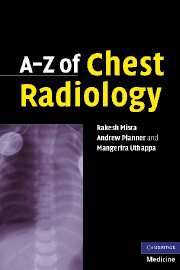Book contents
- Frontmatter
- Contents
- List of abbreviations
- Part I Fundamentals of CXR interpretation – ‘the basics’
- Part II A–Z Chest Radiology
- Abscess
- Achalasia
- Alveolar microlithiasis
- Aneurysm of the pulmonary artery
- Aortic arch aneurysm
- Aortic rupture
- Asbestos plaques
- Asthma
- Bochdalek hernia
- Bronchiectasis
- Bronchocele
- Calcified granulomata
- Carcinoma
- Cardiac aneurysm
- Chronic obstructive pulmonary disease
- Coarctation of the aorta
- Collapsed lung
- Consolidated lung
- Diaphragmatic hernia – acquired
- Diaphragmatic hernia – congenital
- Embolic disease
- Emphysematous bulla
- Extrinsic allergic alveolitis
- Flail chest
- Foregut duplication cyst
- Foreign body – inhaled
- Foreign body – swallowed
- Goitre
- Haemothorax
- Heart failure
- Hiatus hernia
- Idiopathic pulmonary fibrosis
- Incorrectly sited central venous line
- Kartagener syndrome
- Lymphangioleiomyomatosis
- Lymphoma
- Macleod's syndrome
- Mastectomy
- Mesothelioma
- Metastases
- Neuroenteric cyst
- Neurofibromatosis
- Pancoast tumour
- Pectus excavatum
- Pericardial cyst
- Pleural effusion
- Pleural mass
- Pneumoconiosis
- Pneumoperitoneum
- Pneumothorax
- Poland's syndrome
- Post lobectomy/post pneumonectomy
- Progressive massive fibrosis
- Pulmonary arterial hypertension
- Pulmonary arteriovenous malformation
- Sarcoidosis
- Silicosis
- Subphrenic abscess
- Thoracoplasty
- Thymus – malignant thymoma
- Thymus – normal
- Tuberculosis
- Varicella pneumonia
- Wegener's granulomatosis
Aortic arch aneurysm
Published online by Cambridge University Press: 25 February 2010
- Frontmatter
- Contents
- List of abbreviations
- Part I Fundamentals of CXR interpretation – ‘the basics’
- Part II A–Z Chest Radiology
- Abscess
- Achalasia
- Alveolar microlithiasis
- Aneurysm of the pulmonary artery
- Aortic arch aneurysm
- Aortic rupture
- Asbestos plaques
- Asthma
- Bochdalek hernia
- Bronchiectasis
- Bronchocele
- Calcified granulomata
- Carcinoma
- Cardiac aneurysm
- Chronic obstructive pulmonary disease
- Coarctation of the aorta
- Collapsed lung
- Consolidated lung
- Diaphragmatic hernia – acquired
- Diaphragmatic hernia – congenital
- Embolic disease
- Emphysematous bulla
- Extrinsic allergic alveolitis
- Flail chest
- Foregut duplication cyst
- Foreign body – inhaled
- Foreign body – swallowed
- Goitre
- Haemothorax
- Heart failure
- Hiatus hernia
- Idiopathic pulmonary fibrosis
- Incorrectly sited central venous line
- Kartagener syndrome
- Lymphangioleiomyomatosis
- Lymphoma
- Macleod's syndrome
- Mastectomy
- Mesothelioma
- Metastases
- Neuroenteric cyst
- Neurofibromatosis
- Pancoast tumour
- Pectus excavatum
- Pericardial cyst
- Pleural effusion
- Pleural mass
- Pneumoconiosis
- Pneumoperitoneum
- Pneumothorax
- Poland's syndrome
- Post lobectomy/post pneumonectomy
- Progressive massive fibrosis
- Pulmonary arterial hypertension
- Pulmonary arteriovenous malformation
- Sarcoidosis
- Silicosis
- Subphrenic abscess
- Thoracoplasty
- Thymus – malignant thymoma
- Thymus – normal
- Tuberculosis
- Varicella pneumonia
- Wegener's granulomatosis
Summary
Characteristics
Permanent localised dilatation of the thoracic aorta. The average diameter of the normal thoracic aorta is < 4.5 cm. This is the commonest mediastinal vascular abnormality. Most are fusiform dilatations (some are saccular), associated with degenerative atherosclerosis with a mean age at diagnosis of 65.
Dissecting aortic aneurysms or intramural haematomas are a specific form of thoracic aneurysm. Again, associated with hypertension and degenerative atherosclerosis, a split in the aortic wall allows blood to track between the intimal and adventitial layers of the aorta. They can occur following trauma. This can produce widening of the aorta and a very high risk of rupture. Slow flow in the false lumen can result in ischaemia and infarction to end organs supplied by the thoracic and ultimately the abdominal aorta. It can be graded by the Stanford classification into type A (ascending aorta and arch – 2/3) and type B descending aorta distal to major vessels (1/3).
Other rarer causes include congenital causes, infection (mycotic aneurysms, e.g. bacteria or syphilis), connective tissue disorders (e.g. cystic medial necrosis in Marfan's syndrome), inflammatory diseases (e.g. Takayasu's) and dilatation post aortic valvular stenosis. These occur in a younger age group.
The size of the aneurysm increases with age.
The risk of rupture increases with aneurysm size.
Clinical features
This is commonly found incidentally on routine CXRs in asymptomatic patients.
The patients may present with substernal, back and/or shoulder pains which can often be severe.
Rarely patients may present with stridor, hoarse voice or dysphagia from the aneurysm compressing local mediastinal structures.
Aortic dissection is associated with aortic regurgitation and cardiac failure, heart murmurs and differential blood pressure measurements in the arms. In addition dissecting aneurysms can produce ischaemia and infarction to end organs (e.g. stroke, renal failure, ischaemic bowel).
[…]
- Type
- Chapter
- Information
- A-Z of Chest Radiology , pp. 32 - 35Publisher: Cambridge University PressPrint publication year: 2007



